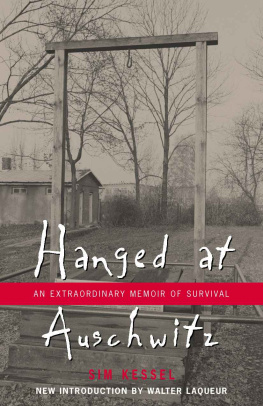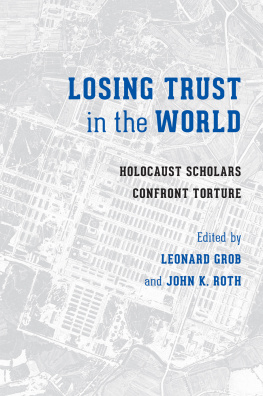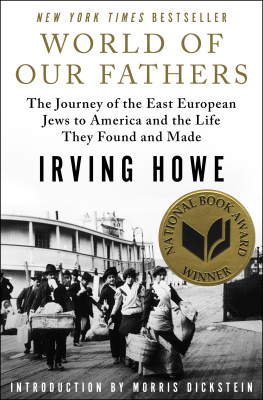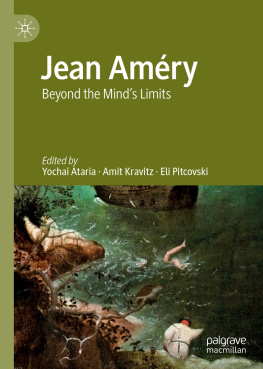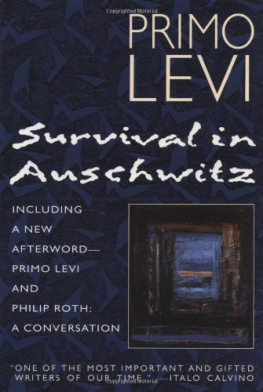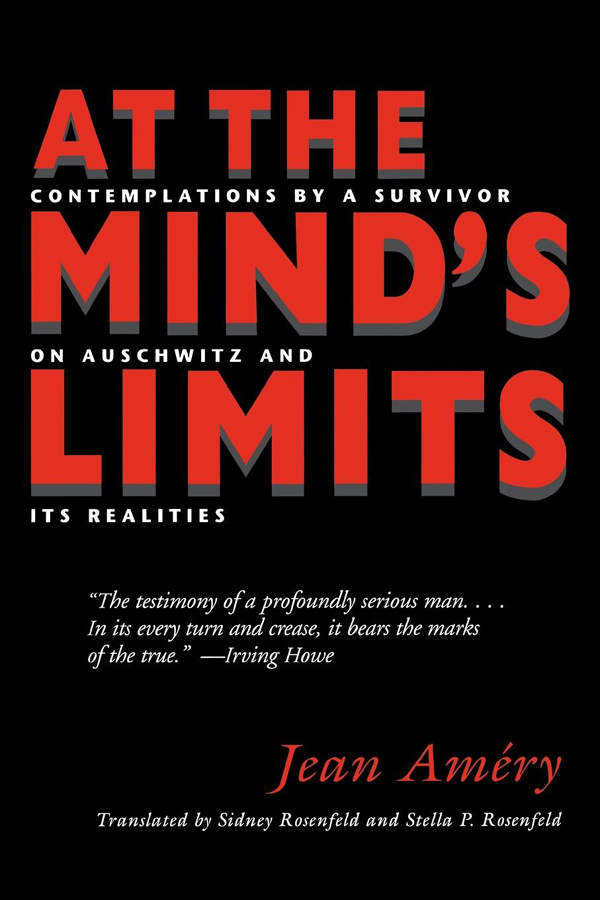At the Minds Limits
Published in Honor of My Husband, Martin D. Schwartz
Helen B. Schwartz
JEAN AMRY
At the Minds Limits
CONTEMPLATIONS BY A SURVIVOR ON AUSCHWITZ AND ITS REALITIES
Translated by
Sidney Rosenfeld and Stella P. Rosenfeld

Published in association with
the United States Holocaust
Memorial Museum.
This book is a publication of
Indiana University Press
601 North Morton Street
Bloomington, IN 47404-3797 USA
http://www.indiana.edu/~iupress
Telephone orders 800-842-6796
Fax orders 812-855-7931
Orders by email
Translation and additional text 1980 by Indiana University Press
Excerpt from letter to the editor of the Daily Telegraph,
6 November 1964, reprinted by permission of Graham Greene.
All rights reserved
No part of this book may be reproduced or utilized in any form or by any means, electronic or mechanical, including photocopying and recording, or by any information-storage and retrieval system, without permission in writing from the publisher. The Association of American University Presses Resolution on Permissions constitutes the only exception to this prohibition.
The paper used in this publication meets the minimum requirements of American National Standard for Information SciencesPermanence of Paper for Printed Library Materials, ANSI Z39.48-1984.
Manufactured in the United States of America
Library of Congress Cataloging-in-Publication Data
Amry, Jean.
At the minds limits.
Translation of Jenseits von Schuld und Shne.
1. Holocaust, Jewish (1939-1945)
Psychological aspectsAddresses, essays, lectures.
2. JewsIdentityAddresses, essays, lectures.
3. Amry, JeanAddresses, essays, lectures.
I. Title.
D810.J4A62213 943.086 80-7682
ISBN 978-0-253-17724-7 (cloth)
ISBN 978-0-253-21173-6 (paper)
7 8 9 10 13 12 11 10 09
Contents
PREFACE TO THE REISSUE, 1977
Between the time this book was written and today, more than thirteen years have passed. They were not good years. One need only follow the reports from Amnesty International to see that in horror this period matches the worst epochs of a history that is as real as it is inimical to reason. Sometimes it seems as though Hitler has gained a posthumous triumph. Invasions, aggressions, torture, destruction of man in his essence. A few indications will suffice: Czechoslovakia 1968, Chile, the forced evacuation of Pnom-Penh, the psychiatric wards of the USSR, the murder squads in Brazil and Argentina, the self-unmasking of the Third World states that call themselves socialist, Ethiopia, Uganda. Given this, what is the good of my attempt to reflect on the conditio inhumana of the victims of the Third Reich? Isnt it all outdated? Or is not at least a revision of my text called for?
But when I read through what I wrote at that time, I discover that a revised edition would be nothing but a trick, a journalistic tribute to actuality, that I am unwilling to retract anything I have said here and have but little to add to it. No doubt: whatever abominations we may have experienced still do not offset the fact that between 1933 and 1945 those things of which I speak in my writings took place among the German people, a people of high intelligence, industrial capability, and unequaled cultural wealthamong the people of Poets and Thinkers. For me this is a fact that until this day remains un-clarified and, despite all the diligent historical, psychological, sociological, and political studies that have appeared and will yet appear, at bottom probably cannot be clarified.
All the attempts at clarification, most of which stressed a single cause, failed ridiculously. It is sheer nonsense to speak of a German national character or to say that what is contained in the symbolic code words Auschwitz and Treblinka was already in the making in German intellectual history from Luther to Kleist to the Conservative Revolution and finally to Heidegger. If one wants to grasp the facts of the matter, it is even less permissible to speak of Fascism as the most excessive form of Late Capitalism. Versailles and the economic crisis with its hardships that drove the people to Nazism is a childish evasion. After 1929 other countries also had their jobless, and among them was America; but it produced a Franklin Delano Roosevelt and not a Hitler. And after Sedan France also suffered its peace without honor. Certainly, it had its chauvinistic ideologues such as Charles Maurras, but in the front line of its history it had those people who in the Dreyfus case were able to defend the existence of the Republic against the concentrated might of the military caste. No Quisling, no Mussert, no Degrelles, no Sir Oswald Mosley came to power through his peoplefrom the rector of a venerable university down to some poor devil in a big-city hovel, an approving, indeed an exultant people. Yes, the German people exulted when finally the Day of Potsdam came, despite the election results that preceded it. I was there. Let no young political scientist, no matter how clever he is, tell me his conceptually untenable stories. To someone who was an eyewitness they appear utterly stupid.
Historiography always sees individual aspects only and misses the forest for the trees, the German forest of the Third Reich. In this case, history itself becomes useless as a concept, and then all that occurs to me is a sentence from Claude Lvi-Strausss book La pense sauvage, where he says that in the end all historical occurrence dissolves into a chain of purely physical processes, and that the word history has no real subject.
On the one hand there is really nothing that provides enlightenment on the eruption of radical Evil in Germany, and on the other hand (despite Chile, despite Brazil, despite the bestial forced evacuation of Pnom-Penh, despite the murder of perhaps a million Indonesian communists after the fall of Sukarno, despite Stalins crimes and the atrocities of the Greek colonels) this Evil really is singular and irreducible in its total inner logic and its accursed rationality. For this reason all of us are still faced with a dark riddle. We know that it did not happen in a developing country, nor as the direct continuation of a tyrannical regime, as in the Soviet Union, nor in the bloody struggle of a revolution fearing for its existence, as in the France of Robespierre. It happened in Germany. It issued, so to speak, through spontaneous generation, from a womb that bore it as a perversion. And all attempts at economic explanations, all the despairing one-dimensional allusions to the fact that German industrial capital, concerned about its privileges, financed Hitler, tell the eyewitness nothing, tell him just as little as the sophisticated speculations about the dialectics of enlightenment.
Therefore, I did not strive for an explicative account at that time, thirteen years ago, and in the same way now too, I can do no more than give testimony. Besides, at this moment I am as little interested in the Third Reich as I was earlier. What occupies me, and what I am qualified to speak about, is the victims of this Reich. I dont want to erect a monument to them, for to be a victim alone is not an honor. I only wanted to describe their conditionwhich is unchangeable. For this reason I have allowed the text, which was first published in 1966, to stand as it was. Only to the chapter On the Necessity and Impossibility of Being a Jew will I make a tiny addition, which for me is gigantic; the present hour demands it.



